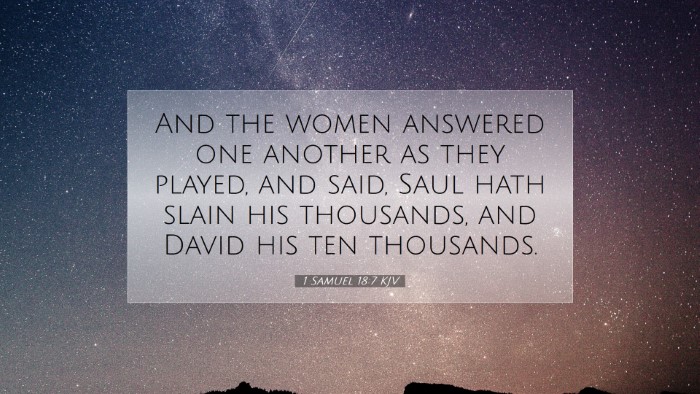Commentary on 1 Samuel 18:7
Verse Context: 1 Samuel 18:7 states, "And the women answered one another as they played, and said, Saul hath slain his thousands, and David his tens of thousands." This moment marks a significant turning point in the relationship between Saul and David. The adoration of the people for David intensifies Saul's jealousy and fear, which becomes a recurring theme throughout the narrative.
Insights from Public Domain Commentaries
Albert Barnes' Notes on the Bible
Public Reaction: Barnes notes that the song sung by the women indicates their joy and admiration for David. The distinction made between Saul and David's achievements highlights David's growing prominence and the transition of favor from Saul to David.
Implication of the Comparison: The emphasis on "thousands" for Saul and "tens of thousands" for David is significant. It not only elevates David above Saul in the public eye but also serves as a severe critique of Saul’s leadership. This comparison is the catalyst for the jealousy that begins to consume Saul, reminding readers of the dangers of pride and the vulnerability of leaders to the opinions of others.
Matthew Henry's Commentary
Jealousy and Envy: Matthew Henry expounds on the emotional turbulence that arises in Saul due to the women’s song. He suggests that envy is consuming Saul and that it is this very envy that leads to his subsequent actions against David. Henry notes that Saul’s reaction is emblematic of how unchecked pride can lead to downfall.
Significance of Music in Ancient Cultures: Henry also emphasizes the role of music in ancient cultures as a means of communication and a reflection of public sentiment. The song is not merely a trivial expression but reflects a deep-seated feeling that has serious implications for the national leadership and the psyche of the king.
Adam Clarke's Commentary
Cultural Context of the Song: Clarke highlights that songs played a vital role in the culture of the time, often marking moments of victory. The women’s singing of David’s greater exploits over Saul's reveals a shift in the social atmosphere, suggesting that David is not only a military hero but has also connected with the heart of the people.
Theological Implications: Additionally, Clarke reflects on the theological dimensions of this event, noting how it is a fulfillment of God's promise to elevate David. This divine orchestration sets the stage for God’s sovereign plan unfolding through the choices of humanity, as seen in the contrasting outcomes for Saul and David.
Theological Reflections
Leadership and Succession: This verse raises critical questions about leadership succession in biblical narratives. The adoration of the crowd signifies a divine favor that moves away from Saul, which poses important considerations for those in leadership. How does one manage the complexities of jealousy and public perception?
The Role of Community in Shaping Leadership: The influence of the community’s voice, as depicted in the song, cannot be overstated. It serves as a reminder of the power of public opinion and the role of communal sentiment in the rise and fall of leaders. For pastors and theologians, understanding this dynamic can inform how they engage with their congregations.
Moral and Ethical Lessons
- Beware of Pride: Saul's downfall is rooted in his inability to handle the rising favor towards David. Leaders must remain humble and vigilant against the encroachments of pride and jealousy.
- Emotional Intelligence: Recognizing one’s emotional responses is essential. Saul's failure to manage his emotions directly affects his leadership and decisions.
- Value of Humility: David's eventual rise serves as encouragement that humble beginnings can lead to great endings. It is a reminder that God’s plans often transcend human expectations.
Conclusion
The narrative surrounding 1 Samuel 18:7 is layered with implications for leadership, human emotion, and divine orchestration. Through the lens of various commentaries, we see the interplay between Saul and David not merely as a rivalry but as a rich commentary on the nature of power, favor, and divine purpose. As pastors, students, and scholars engage with this text, they are encouraged to delve deep into its themes, drawing lessons that can inform their understanding of leadership and the dynamics of human relationships.


